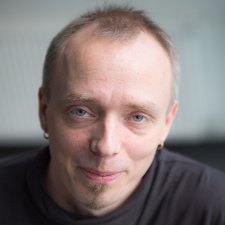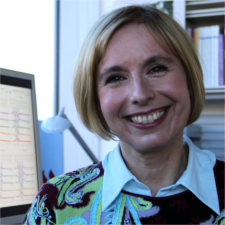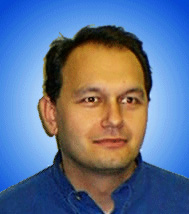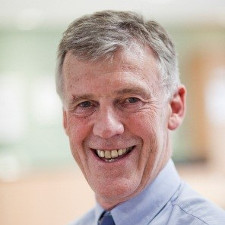
Keynote Speakers
 Tuomas Virtanen is Professor at Laboratory of Signal Processing, Tampere University of Technology (TUT), Finland, where he is leading the Audio Research Group. He received the M.Sc. and Doctor of Science degrees in information technology from TUT in 2001 and 2006, respectively. He has also been working as a research associate at Cambridge University Engineering Department, UK. He is known for his pioneering work on single-channel sound source separation using non-negative matrix factorization based techniques, and their application to noise-robust speech recognition and music content analysis. Recently he has done significant contributions to sound event detection in everyday environments. In addition to the above topics, his research interests include content analysis of audio signals in general and machine learning. He has authored more than 100 scientific publications on the above topics, which have been cited more than 5000 times. He has received the IEEE Signal Processing Society 2012 best paper award for his article “Monaural Sound Source Separation by Nonnegative Matrix Factorization with Temporal Continuity and Sparseness Criteria” as well as three other best paper awards. He is an IEEE Senior Member, member of the Audio and Acoustic Signal Processing Technical Committee of IEEE Signal Processing Society, Associate Editor of IEEE/ACM Transaction on Audio, Speech, and Language Processing, and recipient of the ERC 2014 Starting Grant.
Tuomas Virtanen is Professor at Laboratory of Signal Processing, Tampere University of Technology (TUT), Finland, where he is leading the Audio Research Group. He received the M.Sc. and Doctor of Science degrees in information technology from TUT in 2001 and 2006, respectively. He has also been working as a research associate at Cambridge University Engineering Department, UK. He is known for his pioneering work on single-channel sound source separation using non-negative matrix factorization based techniques, and their application to noise-robust speech recognition and music content analysis. Recently he has done significant contributions to sound event detection in everyday environments. In addition to the above topics, his research interests include content analysis of audio signals in general and machine learning. He has authored more than 100 scientific publications on the above topics, which have been cited more than 5000 times. He has received the IEEE Signal Processing Society 2012 best paper award for his article “Monaural Sound Source Separation by Nonnegative Matrix Factorization with Temporal Continuity and Sparseness Criteria” as well as three other best paper awards. He is an IEEE Senior Member, member of the Audio and Acoustic Signal Processing Technical Committee of IEEE Signal Processing Society, Associate Editor of IEEE/ACM Transaction on Audio, Speech, and Language Processing, and recipient of the ERC 2014 Starting Grant.
Computational Analysis of Sound Events in Realistic Multisource Environments
Realistic everyday soundscapes often consists of multiple concurrently present sound sources, containing important information for many applications. Recent development in machine learning, especially deep learning has allowed the development of methods to automatically recognize sounds even in these challenging multisource environments. This talk will give an overview of the recent developments in the field. We will start by first discussing the typology of various audio analysis tasks, including classification, detection, and tagging, of both higher-level sound scene categories and also individual sound events. We will then present specific methods based on deep neural networks, which use multilabel classification for efficient multi-source recognition. We will present a convolutional recurrent neural network based approach that has successfully been used in many scene analysis problems. We present how such a network allows simultaneously learning relevant acoustic features for recognition and modeling longer temporal context. The talk will also summarize findings from the recent public DCASE evaluation campaigns.
Orly Alter
Scientific Computing & Imaging Institute
Huntsman Cancer Institute
University of Utah, USA
Comparative Spectral Decompositions for Personalized Cancer Diagnostics and Prognostics
Slides for this keynote
I will describe the development of novel, multi-tensor generalizations of the singular value decomposition, and their use in the comparisons of brain, lung, ovarian, and uterine cancer and normal genomes, to uncover patterns of DNA copy-number alterations that predict survival and response to treatment, statistically better than, and independent of, the best indicators in clinical use and existing laboratory tests. Recurring alterations have been recognized as a hallmark of cancer for over a century, and observed in these cancers’ genomes for decades; however, copy-number subtypes predictive of patients’ outcomes were not identified before. The data had been publicly available, but the patterns remained unknown until the data were modeled by using the multi-tensor decompositions, illustrating the universal ability of these decompositions – generalizations of the frameworks that underlie the theoretical description of the physical world – to find what other methods miss. Danilo P. Mandic is a Professor in signal processing with Imperial College London, UK, and has been working in the areas of adaptive signal processing and bioengineering. He is a Fellow of the IEEE, member of the Board of Governors of International Neural Networks Society (INNS), member of the Big Data Chapter within INNS and member of the IEEE SPS Technical Committee on Signal Processing Theory and Methods. He has received five best paper awards in Brain Computer Interface, runs the Smart Environments Lab at Imperial, and has more than 300 publications in journals and conferences. He has authored/coauthored research monographs: Recurrent Neural Networks for Prediction (Wiley, 2001), Complex Valued Nonlinear Adaptive Filters: Nonlinearity, Widely Linear and Neural Models (Wiley, 2009), and a two volume monograph Tensor Networks for Dimensionality Reduction and Large Scale Optimisation (Now Publishers, 2016, 2017). Prof Mandic has received the President Award for Excellence in Postgraduate Supervision at Imperial. He is a pioneer of Ear-EEG, a radically new in-the-ear-canal EEG recording system, and has extended this work to in-ear monitoring of vital signs. This work appeared in IEEE Spectrum, MIT Technology Review and has won several awards.
Danilo P. Mandic is a Professor in signal processing with Imperial College London, UK, and has been working in the areas of adaptive signal processing and bioengineering. He is a Fellow of the IEEE, member of the Board of Governors of International Neural Networks Society (INNS), member of the Big Data Chapter within INNS and member of the IEEE SPS Technical Committee on Signal Processing Theory and Methods. He has received five best paper awards in Brain Computer Interface, runs the Smart Environments Lab at Imperial, and has more than 300 publications in journals and conferences. He has authored/coauthored research monographs: Recurrent Neural Networks for Prediction (Wiley, 2001), Complex Valued Nonlinear Adaptive Filters: Nonlinearity, Widely Linear and Neural Models (Wiley, 2009), and a two volume monograph Tensor Networks for Dimensionality Reduction and Large Scale Optimisation (Now Publishers, 2016, 2017). Prof Mandic has received the President Award for Excellence in Postgraduate Supervision at Imperial. He is a pioneer of Ear-EEG, a radically new in-the-ear-canal EEG recording system, and has extended this work to in-ear monitoring of vital signs. This work appeared in IEEE Spectrum, MIT Technology Review and has won several awards.
Tensor Networks and their Potential Applications in Dimensionality Reduction and Blind Signal Processing
In this talk we discuss briefly tensor networks which provide a natural sparse and distributed representation for large scale data, and address both established and emerging methodologies for tensor-based decomposition and optimization. Our particular focus will on low-rank tensor network representations, which allow for huge data tensors to be approximated (compressed) by interconnected low-order core tensors. The usefulness of this concept is illustrated over a number of applied areas, including multiway analysis, multilinear ICA/BSS, deep learning, generalized regression, tensor canonical correlation analysis and higher order partial least squares. Special emphasis will be given to the links between tensor networks and deep learning and abilities of some specific tensor networks that significantly compress both the fully connected layers and the convolutional layers of deep neural networks.- Cichocki, A., Lee, N., Oseledets, I., Phan, A. H., Zhao, Q., & Mandic, D. P. (2016). Tensor Networks for Dimensionality Reduction and Large-Scale Optimization: Part 1 Low-Rank Tensor Decompositions. Foundations and Trends® in Machine Learning, 9(4-5), 249-429. https://arxiv.org/abs/1609.00893
- Cichocki, A., Phan, A. H., Zhao, Q., Lee, N., Oseledets, I., Sugiyama, M., & Mandic, D. P. (2017). Tensor Networks for Dimensionality Deduction and Large-Scale Optimization: Part 2 Applications and Future Perspectives. Foundations and Trends® in Machine Learning, 9(6), 431-673. https://arxiv.org/abs/1708.09165
- Cichocki, A., Mandic, D., De Lathauwer, L., Zhou, G., Zhao, Q., Caiafa, C., & Phan, H. A. (2015). Tensor Decompositions for Signal Processing Applications: From Two-Way to Multiway Component Analysis. IEEE Signal Processing Magazine, 32(2), 145-163.
 Philip Nelson holds the post of Professor of Acoustics in the Institute of Sound and Vibration Research at the University of Southampton. He has personal research interests in the fields of acoustics, vibrations, signal processing, control systems and fluid dynamics and is the author or co-author of 2 books, over 120 papers in refereed journals, 30 granted patents, and over 200 other technical publications. He served from 2005-2013 as Pro Vice-Chancellor of the University of Southampton, with particular responsibility for Research and Enterprise. He previously served as Director of the Institute of Sound and Vibration Research and as Director of the Rolls-Royce University Technology Centre in Gas Turbine Noise. Professor Nelson is a Chartered Engineer and a Fellow of the Royal Academy of Engineering. He is the recipient of both the Tyndall and Rayleigh Medals of the Institute of Acoustics, and was President of the International Commission for Acoustics from 2004-2007. He also served as the Chair of the Sub-Panel for General Engineering in REF 2014. From 2014 he has been Chief Executive of the Engineering and Physical Sciences Research Council and took on the role of Chair of the RCUK Executive Group from October 2015. He was made a Commander of the Order of the British Empire in the 2018 New Year Honours for his services to UK Engineering and Science.
Philip Nelson holds the post of Professor of Acoustics in the Institute of Sound and Vibration Research at the University of Southampton. He has personal research interests in the fields of acoustics, vibrations, signal processing, control systems and fluid dynamics and is the author or co-author of 2 books, over 120 papers in refereed journals, 30 granted patents, and over 200 other technical publications. He served from 2005-2013 as Pro Vice-Chancellor of the University of Southampton, with particular responsibility for Research and Enterprise. He previously served as Director of the Institute of Sound and Vibration Research and as Director of the Rolls-Royce University Technology Centre in Gas Turbine Noise. Professor Nelson is a Chartered Engineer and a Fellow of the Royal Academy of Engineering. He is the recipient of both the Tyndall and Rayleigh Medals of the Institute of Acoustics, and was President of the International Commission for Acoustics from 2004-2007. He also served as the Chair of the Sub-Panel for General Engineering in REF 2014. From 2014 he has been Chief Executive of the Engineering and Physical Sciences Research Council and took on the role of Chair of the RCUK Executive Group from October 2015. He was made a Commander of the Order of the British Empire in the 2018 New Year Honours for his services to UK Engineering and Science.
